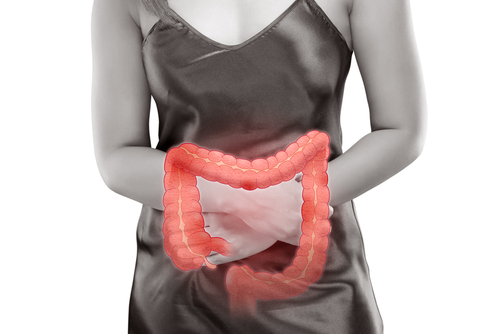How many of you were diagnosed with irritable bowel syndrome (IBS) before endometriosis was finally discovered?
Doctors have mistaken endometriosis for IBS for decades, and while there are clearly issues with that misdiagnosis, the digestive and stomach issues associated with endometriosis are undeniable. One of my earliest symptoms of endometriosis was bloating. My bloating was so dramatic that I could easily look six months pregnant. Yet doctors dismissed it as gas and didn’t investigate it any further, despite this occurring at some point every day since the age of about 10.
It took me a couple of years post-diagnosis to discover my upset stomach problems, nausea, and bloating were actually linked to endometriosis, and that I wasn’t alone. In fact, 7,061 Instagram posts exist at the hashtag #endobelly, and every single endometriosis patient I speak to has some sort of stomach problem.
It’s not just a coincidence. In the brilliant book, “Take Control of Your Endometriosis,” author Henrietta Norton writes that “the growing body of evidence suggests women with endometriosis suffer from higher rates of food allergies and intolerances.” One specialist center in Atlanta conducted private research of their patients and found intestinal cramping and painful bowel movements occurred in 25 percent of patients, constipation in 35 percent, and diarrhea in more than 60 percent.
While known endometriosis symptoms were vaguer in the past, we now have a wider variety of symptoms, which includes various stomach conditions. Endometriosis UK lists these as painful bowel movements, bleeding from the bowel, and symptoms of irritable bowel (diarrhea, constipation, bloating — particularly during your period).
Another issue that the general population struggles with is the balance of “good” and “bad” bacteria in our guts. Antibiotics, processed food, and excess ingredients like sugar are causing imbalances that affect not only our digestion but even our mental health. I’ve interviewed and consulted with several nutritionists over the past few years, and all of them suggested addressing our stomach issues by first dealing with our gut bacteria.
From the growing research on this subject, it seems a good idea for all of us to pay more attention to this. Giulia Enders’s “Gut: The Inside Story of Our Body’s Most Underrated Organ” could be a great way to start this journey. If reading isn’t for you, the author has done several talks on the subject, which you can watch online.
IBS-like symptoms with endometriosis can also indicate that the disease has spread to the bowel area. Two main types of bowel endometriosis exist: Superficial endometriosis, in which growths are found on the outer surface of the bowel, and deep bowel endometriosis, when the disease penetrates the bowel wall and can be found internally. In some patients, recto-vaginal nodules may first begin as superficial but could move into the bowel wall over time. Usually, with a form of bowel endometriosis, your IBS symptoms will become further aggravated or painful nearer to and during your period.
Endometriosis UK says bowel endometriosis symptoms include pain on opening the bowels, deep pelvic pain during sex, and rectal bleeding during a period. However, if you’re concerned you may have bowel endometriosis but you don’t have all these symptoms, please don’t dismiss it. We’re all different, and endometriosis can be symptomless for some people.
Having said all of this, endometriosis can still cause you IBS-like symptoms without it touching your bowel. Equally, while we know that many women suffer from bloating and sensitivities, there’s still not much research into why this occurs. If you visit a specialist for endometriosis, they often treat the disease with surgery, hormones, and painkillers. But this won’t necessarily help with your stomach issues, and in fact, painkillers are known to aggravate these problems. In tomorrow’s column, I’m going to discuss the ways I have learned to manage my stomach challenges, and the alternative treatments and diet changes you can make to reduce these symptoms.
***
Note: Endometriosis News is strictly a news and information website about the disease. It does not provide medical advice, diagnosis, or treatment. This content is not intended to be a substitute for professional medical advice, diagnosis, or treatment. Always seek the advice of your physician or other qualified health provider with any questions you may have regarding a medical condition. Never disregard professional medical advice or delay in seeking it because of something you have read on this website. The opinions expressed in this column are not those of Endometriosis News or its parent company, BioNews Services, and are intended to spark discussion about issues pertaining to endometriosis.


